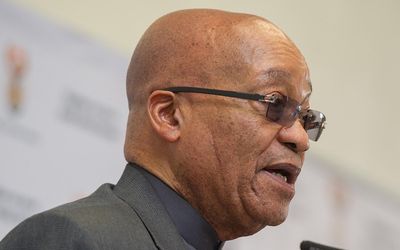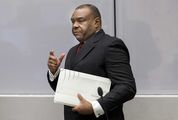We cannot have a leader who cedes part of his job to corrupt business interests
by Fanie du Toit,
2016-03-17 17:33:43.0
WITH the admission by Deputy Finance Minister Mcebisi Jonas that the Guptas offered him the position of finance minister, President Jacob Zuma’s position has become untenable. This follows similar allegations from Vytjie Mentor.
Zuma has to resign forthwith. If he fails to do so, the African National Congress’s (ANC’s) national executive committee needs to recall him; otherwise the party will enter the local municipal elections with little of the credibility it once had.
The central responsibility of a president is to guard the interests of his country’s citizens. Not only has Zuma acknowledged with remarkable candour that his party political interests trump his presidential responsibilities. Jonas’s admission appears to confirm that he has ceded vital components of his job to nondemocratic, collusive and corrupt business interests.
If this is indeed true, SA’s sovereignty is at stake and its citizens, both inside and outside the ruling party, must act with urgency. As an eminent ANC leader at the weekend told those who attended the launch of Archbishop Thabo Makgoba’s Socio-Economic Future of SA (Sefsa) initiative, "the leaders of the liberation movement are now in need of liberation themselves. They have been captured by outside interests."
Another key leader added that "although SA is not broken, it is in deep crisis, and if the trend of corruption under Zuma’s administration is not reversed, most importantly by removing him, an implosion is inevitable".
In the light of these developments, the fact that the public protector was accused by ANC MPs of being a "foreign agent" is starkly ironic. It is also unspeakably sad.
The Institute for Justice and Reconciliation (IJR) prides itself, in its own modest way, in bringing together South Africans of all walks of life in incisive dialogue aimed at increasing the justice dividend for those who remain most marginalised in post-apartheid SA.
But its most recent research, published through the Afrobarometer, South African Reconciliation Barometer and Transformation Audit reports, all corroborate the trend highlighted at the Sefsa convention: "Vertical" trust — in political leaders and democratic institutions — is in free fall. What this does, as anywhere else in the world, is lead to a diminishing "horizontal" trust between different social groupings in society.
It is therefore no coincidence that the Zuma administration faces so much social tension — racial, xenophobic, labour-related or otherwise. South Africans of all stripes have lost faith in their president (his approval rating is now hovering at 36%, down from over 60% a couple of years ago), and by extension, in most of its government. As a result they are retreating into their social laagers.
The dire economic situation, also made worse by a series of Zuma blunders, does not help, but could be a whole lot more effectively addressed if the nation shared a common purpose, if integrity was front and centre in our discussions, and if we were led more capably. Unfortunately for South Africans, trust is only built through predicable behaviour, whereas corruption renders political leaders unpredictable.
No longer guided by ethical or professional considerations, such leaders constantly surprise everyone around them, and all those watching from afar, because of the lack of consistent, responsible and ethical decision-making. Thus, self-interest undermines public trust in political leaders, but also in democratic institutions, and ultimately, in one another.
The Guptas deny all allegations by Jonas, as one would expect them to. At the same time, in a truly bizarre and somewhat sinister turn, new Finance Minister Pravin Gordhan is now required not only to fight for his country’s ruined economic credentials, but also for his position. It is leaving investors perplexed, and citizens aghast.
In this trust vacuum, allegations are flying in all directions. One of the most dramatic is that a R13bn illicit cigarettes trade is one of the central issues, if not the main cause, of the almighty power tussle between Gordhan, who is keen to see this industry regularised and thus for the fiscus to benefit from the income it is due, and those Zuma-cronies who are alleged to be behind the syndicate.
Is this true? How could we as citizens know? Perhaps we would know more if the South African Revenue Service were allowed to do its due diligence work unhindered. Commentator Max du Preez talks about a document in the SARS vaults that contains explosive information. The South African public is now rightly suspicious of the motivations of their president and his cronies. And the public deserves an answer.
We all know that SA needs a growing economy, effective redistribution programmes, strong accountability and a unifying, squeaky-clean leader. The last requirement is the easiest to remedy, and it would do us no end of good in pursuit of the other three.
• Du Toit is executive director of the IJR.

Jacob Zuma. Picture: NTSWE MOKOENA
WITH the admission by Deputy Finance Minister Mcebisi Jonas that the Guptas offered him the position of finance minister, President Jacob Zuma’s position has become untenable. This follows similar allegations from Vytjie Mentor.
Zuma has to resign forthwith. If he fails to do so, the African National Congress’s (ANC’s) national executive committee needs to recall him; otherwise the party will enter the local municipal elections with little of the credibility it once had.
The central responsibility of a president is to guard the interests of his country’s citizens. Not only has Zuma acknowledged with remarkable candour that his party political interests trump his presidential responsibilities. Jonas’s admission appears to confirm that he has ceded vital components of his job to nondemocratic, collusive and corrupt business interests.
If this is indeed true, SA’s sovereignty is at stake and its citizens, both inside and outside the ruling party, must act with urgency. As an eminent ANC leader at the weekend told those who attended the launch of Archbishop Thabo Makgoba’s Socio-Economic Future of SA (Sefsa) initiative, "the leaders of the liberation movement are now in need of liberation themselves. They have been captured by outside interests."
Another key leader added that "although SA is not broken, it is in deep crisis, and if the trend of corruption under Zuma’s administration is not reversed, most importantly by removing him, an implosion is inevitable".
In the light of these developments, the fact that the public protector was accused by ANC MPs of being a "foreign agent" is starkly ironic. It is also unspeakably sad.
The Institute for Justice and Reconciliation (IJR) prides itself, in its own modest way, in bringing together South Africans of all walks of life in incisive dialogue aimed at increasing the justice dividend for those who remain most marginalised in post-apartheid SA.
But its most recent research, published through the Afrobarometer, South African Reconciliation Barometer and Transformation Audit reports, all corroborate the trend highlighted at the Sefsa convention: "Vertical" trust — in political leaders and democratic institutions — is in free fall. What this does, as anywhere else in the world, is lead to a diminishing "horizontal" trust between different social groupings in society.
It is therefore no coincidence that the Zuma administration faces so much social tension — racial, xenophobic, labour-related or otherwise. South Africans of all stripes have lost faith in their president (his approval rating is now hovering at 36%, down from over 60% a couple of years ago), and by extension, in most of its government. As a result they are retreating into their social laagers.
The dire economic situation, also made worse by a series of Zuma blunders, does not help, but could be a whole lot more effectively addressed if the nation shared a common purpose, if integrity was front and centre in our discussions, and if we were led more capably. Unfortunately for South Africans, trust is only built through predicable behaviour, whereas corruption renders political leaders unpredictable.
No longer guided by ethical or professional considerations, such leaders constantly surprise everyone around them, and all those watching from afar, because of the lack of consistent, responsible and ethical decision-making. Thus, self-interest undermines public trust in political leaders, but also in democratic institutions, and ultimately, in one another.
The Guptas deny all allegations by Jonas, as one would expect them to. At the same time, in a truly bizarre and somewhat sinister turn, new Finance Minister Pravin Gordhan is now required not only to fight for his country’s ruined economic credentials, but also for his position. It is leaving investors perplexed, and citizens aghast.
In this trust vacuum, allegations are flying in all directions. One of the most dramatic is that a R13bn illicit cigarettes trade is one of the central issues, if not the main cause, of the almighty power tussle between Gordhan, who is keen to see this industry regularised and thus for the fiscus to benefit from the income it is due, and those Zuma-cronies who are alleged to be behind the syndicate.
Is this true? How could we as citizens know? Perhaps we would know more if the South African Revenue Service were allowed to do its due diligence work unhindered. Commentator Max du Preez talks about a document in the SARS vaults that contains explosive information. The South African public is now rightly suspicious of the motivations of their president and his cronies. And the public deserves an answer.
We all know that SA needs a growing economy, effective redistribution programmes, strong accountability and a unifying, squeaky-clean leader. The last requirement is the easiest to remedy, and it would do us no end of good in pursuit of the other three.
• Du Toit is executive director of the IJR.























Change: 1.19%
Change: 1.36%
Change: 2.19%
Change: 1.49%
Change: -0.77%
Data supplied by Profile Data
Change: -0.08%
Change: 0.12%
Change: 1.19%
Change: 0.00%
Change: 0.10%
Data supplied by Profile Data
Change: 0.32%
Change: 0.39%
Change: 0.40%
Change: 0.22%
Change: 0.58%
Data supplied by Profile Data
Change: 0.09%
Change: -0.41%
Change: -0.06%
Change: -0.33%
Change: 0.10%
Data supplied by Profile Data